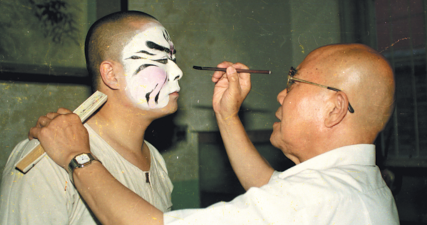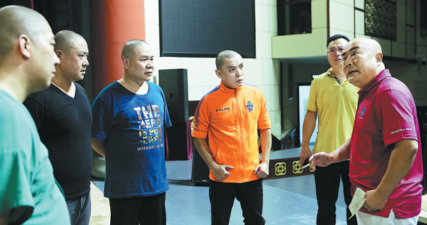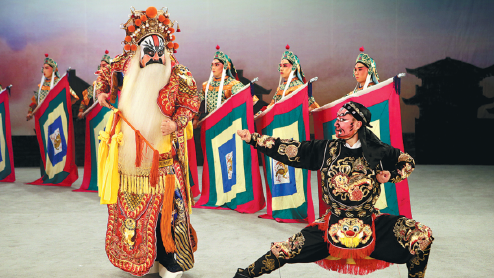NPC deputy spares no effort to carry forward Peking Opera
Director and star of the traditional genre passes on tips to bring in a new generation, Zhang Xiaomin reports in Dalian, Liaoning.
"Well done! But don't sing too high here," says director Yang Chi of Dalian Peking Opera Theater. The instructions seem to echo around the ornate theater where the director often goes to see rehearsals and gives young actors guidance on appearance, gesture, eye expression, speech and emotion.
Yang, 62, a well-known Peking Opera performer, has been engaged in the art since 1972, when he was admitted to the Peking Opera class of an art school in Dalian, Liaoning province.
"Peking Opera is the quintessence of Chinese culture. It shows the special charm of Eastern aesthetics in its singing, acting, recitation, acrobatics and dancing," says Yang, who has pocketed almost all the highest awards for opera in China.
According to Yang, people can see the traces of many kinds of traditional Chinese operas in Peking Opera, which is the epitome of Chinese operas, even though it is only over 200 years old. Yang was trained to play laosheng, the elderly male role. He laid a solid foundation for both high-quality singing and martial arts skills.
Later, in the late '80s, he switched to play hualian, painted-face characters, and won a reputation for his loud and profound voice, beautiful posture and all-around qualities.
He has performed in more than 20 countries and regions, including the United States, Britain, France, and Germany.
"As an old Chinese saying goes, 'A minute on the stage takes 10 years of practice.' Without hard practice, one can never become a good Peking Opera actor," says Yang.
"Practice makes perfect. It is common to practice a movement 100 times. The headstand, which lasts 20 to 30 minutes at a time, is also a compulsory course for us," he says, adding that young actors today generally lack the fortitude to bear such hardships.
Nowadays, people have more channels to get information and have more hobbies. Fewer people have the inclination to either learn or enjoy Peking Opera.
Yang admits that he has been worried about the lack of successors.
"The key to the prosperity of Peking Opera lies in people. It needs to be carried forward and promoted by generations. However, such problems as poor financing and low pay still beset its development," he says.
He had heard that, in order to earn more, some young actors in other traditional opera troupes are doing part-time jobs as deliverymen, while others work as barmen after hours.
"Under such circumstances, it is impossible for our young players to put more energy into training, and the problem becomes even worse that there will be no followers," he says.
Yang communicated with many art troupes and young actors and conducted in-depth research and reflection on such problems.
During this year's annual sessions of the National People's Congress and the National Committee of the Chinese People's Political Consultative Conference, Yang, an NPC deputy, suggested improving salaries for Chinese opera performers, increasing funding and support for classic and traditional operas, and promoting exchanges and performances of fine works across the country.
"Peking Opera is a 'living' art, whose artistic value exists in every artist," Yang says, adding that he hopes that, through his efforts, both famous actors and ordinary practitioners can gain a wider recognition of the value of the profession.
"A masterpiece by a famous painter might be worth more 100 years later. But for Peking Opera masters, it is a different story," he says.
When Yang was 21, he got the chance to learn from noted artist Yuan Shihai, who drew on the strengths of other masters and formed his own style of performing art named the "Yuan school".
Yang still vividly remembers the first time Yuan taught him how to play a scene, and then he went to enjoy the master's performance on stage.
"When he appeared on stage, I was dumbfounded. It was like a high school student finding out that he just got tutored by a Nobel Prize winner," says Yang. "It was at that moment, when I saw it with my own eyes, that I knew what 'good performance' meant."
Yang says even though he learned a lot from Yuan, he can only carry on a small part of Yuan's talent. After the teacher's death in 2002, the authentic "Yuan school" art ceased to exist.
That is why Yang always stresses that people are the most important resource for the inheritance of Peking Opera.
According to the report to the 20th National Congress of the Communist Party of China held last year, China will build cultural confidence and strength and secure new successes in developing socialist culture.
"To carry forward the quintessence of Peking Opera and revitalize traditional culture is a reflection of cultural confidence," says Yang, adding that the opera is like an encyclopedia of traditional Chinese culture.
"Its melody, singing, dancing, makeup and costumes all embody the unique charm of Chinese art."
Yang has been working as director of the Dalian Peking Opera Theater since 2000.
Today, both Yang and the theater have become a calling card for the port city in Northeast China.
Over the years, apart from daily rehearsals, performances and exchanges, the troupe has also undertaken the task of bringing Peking Opera to schools, islands and residential communities.
Yang believes that their work has achieved good results.
"The audience in the theater used to be all old people, but now there are many young faces. Some college students have even become fans of our Peking Opera performers," he says.
"There are also parents bringing their children to the theater. I've found that it's easy to get kids to like the art form if they can just sit down and enjoy for a while."
Yang's approach to the art form was inspired by his father, a fan of Peking Opera.
"When I was a little boy, I liked playing outside with other kids. Once I heard Peking Opera playing on the radio, I immediately stopped playing and ran home to listen to it," Yang recalls.
He also feels grateful that he benefited from meeting a good, enlightening teacher, Liu Jinchang, when he started learning the opera.
"I was only 11. Sometimes I could not understand why he was so strict. When I grew up, I realized that it was because of that, I had laid a solid foundation."
Yang says the theater plans to set up training courses for kids, teaching them the basic skills of Peking Opera and enhancing their energy and spirit with traditional Chinese culture.

Yang Chi's teacher, the late Yuan Shihai (right), a noted Peking Opera master, applies makeup to Yang in 1994. [Photo/China Daily]

Yang (first from right) instructs performers at a national training class on the genre of the Yuan school of Peking Opera in Aug 2017. [Photo/China Daily]

Yang Chi (left) plays the role of Lian Po, a famous general of the Warring States Period (475-221 BC). [Photo/China Daily]
- Top legislature schedules session for Wednesday
- China's top legislator meets with British PM
- China's top legislator holds talks with president of Senegalese National Assembly
- China's top legislator meets with Finnish PM
- Top legislator calls for advancing people's congress work in line with Party, State priorities



